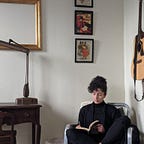Part 2: El Ingeniero con Alma de Poeta
An Artist in Mexico
In Mexico, my father joined a community of artists cultivating evenings of poetry recitals amidst a growing collection of records.
His earliest paintings depicted various renditions of boats docked on a harbor, each line benefitting from the care and precision that dissipated in his later years. Day after day, hours at a time, he devoted himself to engineering by daytime and oil on canvas by day’s end.
Becoming an artist relied on both skill and community, guiding him towards kindred spirits that inspired and instructed his creations.
Amidst the evenings filled with cigarrette smoke and tango, my father met a daughter of Salvadorians also living in Mexico at the time. She studied accounting and shared my father’s love for music, ensuing a mutual quest to attend performances by historic cancionistas such as Agustín Lara. They were married in El Salvador before returning to Venezuela for my father’s last year of college.
Dinorah gave birth to five of my father’s children and accompanied him to many cities before passing away to leukemia three decades into their courtship and marriage. She famously disliked the cold, testing her love for my father as he received an acceptance letter to the Colorado School of Mines for graduate studies in metallurgy.
In Colorado, he swapped evenings of tango for endless nights at the lab while his wife and children adapted to harsh winters. Blinded by his passions, my father immersed himself in his work so much so he occasionally forgot to pick up the kids from school, attributing these mental lapses to his growing sense of discovery. In retrospect, these became the best years of his life.
As I walked the School of Mines campus a few weeks prior to my own graduate studies, I imagined my father’s long and determined strides traversing a courtyard covered in snow. With each step, his roots in El Remolino loosened as he stretched across oceans and towards foreign lands. Roots, however, are also capable of restraint.
He returned to Venezuela dejected with only six academic credits standing between him and a PhD. Of all injustices plaguing his life as an immigrant, his inability to secure the necessary funding for a final semester in the doctorate curriculum hung heavy on the neck of a man convinced of his capacity to achieve the unknowable.
Employers in Venezuela celebrated his Master’s degree and looked no further than his name when hiring and promoting him to positions of influence. Yet he never found peace in fragmented dreams truncated short of completion. As he neared the end of his life and took stock of all he achieved, as men usually do, I believe this is the only thread in his life he felt frayed and incomplete.
